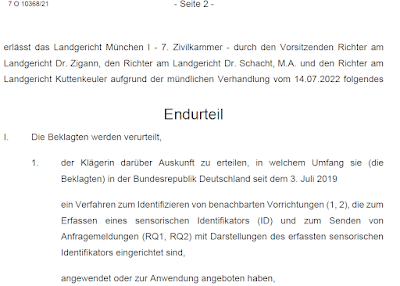Since last year I've been observing that Sony is an unreasonable--or, to use a word with which Sony was threatening the UK CMA with an appeal and which a journalist thought might describe Sony itself: irrational--complainant over Microsoft's acquisition of Activision Blizzard King. Today I learned that Sony's conduct as a patent applicant also raises serious psychiatric questions.
It was actually not another patent blog but GameRant that drew my attention to it:
Sony Throws Shade at Microsoft and Nintendo in Newly Published Patent
A newly published Sony patent oddly refers to Microsoft and Nintendo home entertainment consoles as 'inferior' to its products.
Hat tip to GameRant, but this is NOT NEW. It's long-standing Sony practice. They've been doing this since at least 2011!
Sony has incorporated that side swipe at Microsoft's Xbox and at Nintendo's consoles like the Switch for a dozen years in dozens of different patent applications.
It's amazing that no one has discovered this "tradition" before, and that no patent office told them a long time ago to stop doing that once and for all. Patent applications are not meant to be propaganda instruments for console warriors.
Here's the relevant language from the patent application GameRant discusses (WO 2023/055447, PCT/US2022(034277)):
"For example, an end user device may be a personal computer, a home entertainment system (e.g., Sony PlayStation2(R) or Sony PlayStation3(R) or Sony PlayStation4(R)), a portable gaming device (e.g., Soy PSP(R) or Sony Vita (R)), or a home entertainment system of a different albeit inferior manufacturer." (emphasis added)
GameRant is correct that "home entertainment system" is clearly defined by Sony's patent applications as video game consoles (or hypothetically multifunctional devices that come with video game console functionality). A patent is always its own dictionary. Therefore, saying that other home entertainment systems come from "different albeit inferior manufacturer[s]" is--as GameRant correctly notes --"obviously targeted at Microsoft and Nintendo."
GameRant is furthermore right that it's "strange for this language to appear in a patent." What is common and legit in patent applications is to explain why the claimed invention is superior over the state of the art (i.e., over technology existing at the time a patent application is filed). In that context, there is nothing wrong with discussing specific technical drawbacks (such as inferior performance, higher power consumption, greater memory footprint) of particular prior art (earlier inventions).
But calling competitors generally "inferior" is gratuitous, stupid, childish, and unprofessional. Even if those manufacturers were inferior, it would not mean that whatever invention a given Sony patent purports to describe--here, a "universal controller"--is by definition innovative and deserving of patent protection.
Sony is obviously the kind of client many patent attorneys want. If a small company went to the same patent attorneys and wanted them to file patent specifications that contain such an outrageous passage, most patent attorneys would decline to attach their names to it.
If Sony wants to engage in comparative advertising, it can do so elsewhere. Gamers are not going to make purchasing decisions based on the language Sony uses in its patent applications.
In November, Video Games Chronicle (VGC) quoted the same language from a different Sony patent application (PlayStation has been working on NFTs and blockchain technology, Sony patent reveals).
I've run some searches of patent databases--after almost 13 years of commenting on high-stakes patent litigation, that's obviously a routine activity for me--and found dozens of Sony patent applications that use the same idiotic language. I believe the oldest one of them--unless I missed an even older one, which can happen--is this one (PDF):
Redeemable Content Specific to Groups
Assignee: Sony Computer Entertainment America LLC
Filed: August 29, 2011
Appl. No.: 13/220,315
Don't get confused by the fact that the publication number is US 2013/0054689: that's the publication date. For the first 18 months, patent applications are in "stealth mode": they're in the database, but not publicly available. Then they get published and are assigned a date. But the filing date was August 29, 2011, and the following image shows the same idiocy as in the much more recent patent application that GameRant discovered (click on the image to enlarge):
Here's just a sample of other Sony patent applications that contain the words "different albeit inferior manufacturer" with (dis)respect to competing video game consoles:
U.S. Patent Application No. 2013/0297393 A1 on "dynamic redemption codes" (filed July 9, 2013)
U.S. Patent No. 10,245,505 B2 on "generating custom recordings of skeletal animations" (filed March 13, 2014)
U.S. Patent No. 10,377,484 B2 on "UAV positional anchors" (filed December 29, 2016)
U.S. Patent No. 10,999,391 B2 on "dynamic filtering and amelioration of content stream manifests" (filed October 30, 2017)
European Patent Application No. EP3710122A1 on "synchronizing session content to external content" (filed October 31, 2018)
U.S. Patent No. 11,080,748 B2 on "targeted gaming news and content feeds" (filed December 14, 2018)
U.S. Patent No. 10,540,746 B2 on "course profiling and sharing" (filed July 30, 2019)
U.S. Patent No. 11,420,130 B2 on "media-object binding for dynamic generation and displaying of data associated with media (filed May 28, 2020)
U.S. Patent No. 11,364,437 B2 on "establishing and managing multiplayer sessions" (filed June 30, 2020)
U.S. Patent No. 11,524,240 B1 on "virtual dojo" (filed August 17, 2021)
U.S. Patent Application No. 2023/0021350 A1 on "health and wellness gamification" (filed August 25, 2021)
U.S. Patent Application No. 2022/0193546 A1 on "content streaming with gameplay launch" (filed December 31, 2021)
GameRant was wondering whether "the offhanded remark" was related to Microsoft's acquisition of Activision Blizzard King, given that the filing GameRant discusses was made in June 2022, "about six months after Microsoft announced" that deal. The above list shows Sony has been doing this systematically for more than a decade. This is not attributable to pride in inventorship. It's just insane.

